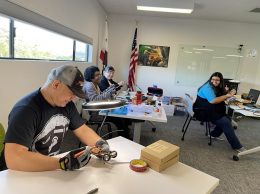The Golden State needs to stop scaring away its manufacturers

At its own peril, California continues to chase away manufacturers.
That’s my takeaway, at least, from reporting on Oxnard-based Haas Automation in the current issue of the Business Times.
As one of the 50 Fastest-Growing Companies in our region, Haas has come to understand how to do business worldwide. As one of the world’s largest manufacturers of machine tools, Haas has ridden the crest of the recovery in the auto business and has seen revenue jump 79 percent to $967 million during the past two years.
Despite that accomplishment or perhaps because of it, California still can’t find a way to accommodate Haas’ desire to expand in Ventura County. Plans for a second manufacturing plant in the U.S. are going forward but it isn’t likely to be in the Golden State, the company said.
Haas’ dilemma isn’t unique. Over the past year, the Business Times has chronicled the story of AG Machining, a Ventura County company founded by Angel Garcia in his garage. The business now has more than 100 employees.
There is also Cool Planet Energy Systems, a company that plans a string of small manufacturing operations that turns bio-waste into a soil enhancer plus a fuel that can be blended with gasoline. Colorado grabbed Cool Planet — a green technology leader — from our region because the cost of building its small waste conversion modules in California was cost-prohibitive.
What California has in its favor is access to the Pacific Rim plus a favorable climate. What it doesn’t have is a government that provides a clear set of rules for manufacturers or a playing field that’s remotely level with other states.
At a program earlier this summer in Paso Robles, Chris Thornberg of Beacon Economics named retaining or expanding the manufacturing base as one major area where California is at risk of falling behind.
That risk is particularly apparent in places such as Ventura County, Santa Maria and northern San Luis Obispo County, where thousands of jobs that pay head-of-households wages in all sorts of areas of specialized manufacturing are tucked away inside low-slung industrial buildings and warehouses.
One of my observations about California during the past 10 years is that it has a tendency toward corporatism, described by economist and Nobel laureate Edmund Phelps as a system where economic activity is controlled by a few large interest groups or the government.
In such as system, Phelps argues in a new book called “Mass Flourishing: How Grassroots Innovation Created Jobs, Challenge and Change,” the corporatists eventually squelch an entrepreneurial culture.
In a review of Phelps’ book in the Aug. 18 issue of the New York Times, economist Robert Shiller says it’s too early to dismiss the U.S. as a corporatist nation.
But in California we’ve seen the rise of a corporatist business culture, with Google and Apple as the poster children for huge, global fiefdoms that get their way and aren’t really accountable to the communities they serve. Add to that an intrusive government where environmentalists, regulatory officials and public employee unions hold a lot of sway.
We could kill a forest of trees debating whether California has gone too far down this rabbit hole. But the bottom line is that the Golden State does have a proto-corporatist approach to dealing with business, and that holds particular perils for a small- to medium-sized manufacturing company.
Not everybody is blind to the situation. Democratic Lt. Gov. Gavin Newsom and Assemblymember Jeff Gorell, a Camarillo Republican, have joined forces to create quick-response teams to help convince companies such as Haas to stay in the state and expand here.
And the state has passed a much-needed sales tax exemption that makes it more affordable for companies to purchase manufacturing equipment.
But very little coming down the pike from Sacramento speaks to restoring a robust manufacturing sector that rewards clean business practices, stimulates the hiring of lots of people or makes it easier for a small manufacturer with a dozen or so employees to expand and grow.
Gene Haas is so concerned about the future of manufacturing that on Aug. 20 he ponied up $1 million via his foundation for scholarships in manufacturing and machining training, presenting a check to the Society of Manufacturing Engineers at a ceremony at the Haas Technical Education Center at Glendale Community College.
“In the U.S. alone, more than 600,000 jobs go unfilled due to a lack of skilled workers,” said foundation chief Bob Murray.
Haas’s vision is to help a new generation of young people, particularly disadvantaged youth, to get an opportunity to advance. That’s yet one more reason why manufacturing matters to California.
• Contact Editor Henry Dubroff at [email protected]










